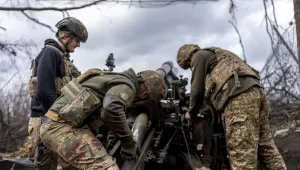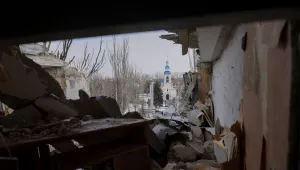The surprising strength of economic sanctions deployed multilaterally against Russia this month has been exceeded only by the surprising strength of the heroic Ukrainian resistance to the invasion of their territory. True, it is hard to imagine sanctions bringing the Russian economy to its knees faster than Russian troops are able to complete the hundred-mile advance to Kyiv from the border. But sanctions have gone macroeconomic. Ultimately, the Russian economy will suffer severely and lastingly.
In December 2021, two months before troops entered Ukraine, US President Joe Biden warned that severe sanctions would impose “a terrible price” on Russia: “I made it absolutely clear to President Putin … that if he moves on Ukraine, the economic consequences for his economy are going to be devastating.” Many viewed these threats as exaggerated rhetoric, without much credibility behind them.
It was possible to see why. At least since the turn of the century, US presidents have had a poor record of matching word and deed in foreign policy. There were even more grounds for skepticism regarding warnings from Europe. Germany, for example, had spent the preceding decade making itself more dependent on Russia for its energy. Altogether, Western sanctions imposed when Putin seized Crimea in 2014 had not had the desired effect.
More generally, most international sanctions historically have accomplished relatively little. Experts tend to view them usually as just a way for a country to register a clear protest, one of the few options in between armed intervention and doing nothing. But this case is different.
* * *
It is easy to lose track of the impressive variety of sanctions that have been trained on the Russian economy. They can be classified into roughly seven categories.
Russian exports of oil and natural gas. A lesson from the history of sanctions is that they need to be multilateral to succeed. On March 8, Biden formally banned the US fossil fuel imports from Russia. This step was not very impactful in itself: The US gets little of its energy from Russia; in any case, the global market makes oil fungible. But it was necessary for the global effort.
On the same day, the UK announced that it will phase out its imports of Urals crude by the end of the year. Most important is the EU, especially Germany, which gets much of its energy in the form of natural gas pumped through pipelines from Russia. The first dramatic signal that multilateral sanctions would be serious this time came February 22: the unexpected, but welcome, a decision by German chancellor Olaf Scholz to suspend the Nord Stream 2 pipeline. The EU, also on March 8, announced plans to cut its gas imports from Russia 2/3 by the end of 2022 (not yet oil), and more later.
It is too bad that China has chosen the wrong side. But the EU and other countries that back sanctions bought more than twice as much of Russia’s oil last year as did China and other countries not backing sanctions.
Russia seeks to deploy economic weapons of its own. Does a boycott against a country have different effects from an embargo by that country? What determines whether a severing of trade links takes the form of a reduction in global demand for Russian oil, thereby lowering its price and maximizing damage to Russian oil producers, versus a reduction in the supply of oil from Russian producers, raising the price they receive? (“You can’t fire me. I quit!”)
My colleague Ricardo Hausmann has a smart idea for how to inflict maximum damage on Russia, and minimize damage on oil-importing countries. The US, Europe, and an alliance of others could drastically reduce their collective demand for Russian oil and gas, not via a quantitative limit, but via a punitive tariff. He mentions a tariff rate as high as 90 %. Rather than the windfall of a higher price accruing to Russian producers, the tariff revenue would go to the importing governments – who could turn around and domestically distribute it in crowd-pleasing ways.
Penalties against other Russian exports. Canada on March 3 became the first to suspend Russia’s status as a Most Favored Nation trade partner, in order to apply higher tariffs on its products. (All WTO members get the favorable MFN standing, excluding a few rogue states. But under the rules it can be suspended on national security grounds.) The US, EU, and the rest of the G-7 countries have followed suit.
“Self-sanctioning.” Many multi-national corporations are getting out ahead of their governments, avoiding business with the pariah nation. This is why Urals crude is selling at a steep discount relative to the Brent benchmark index.
The embargo on exports to Russia. The country is dependent on some particular products of US and European firms, especially technological goods like semi-conductors, lasers, navigational equipment, and telecommunications equipment. Being cut off from these exports is likely to inflict severe damage on Russia’s economy, including its military. A prominent example is spare parts for American-built airplanes, without which even domestic air travel is likely to become increasingly difficult over time.
Closely related is the withdrawal of foreign investors, that is, the suspension or termination by western companies of operations that they had set up to sell into the market locally. PepsiCo, Unilever, Zara, Ikea, and Goldman Sachs are just a few such corporations. More are likely to follow.
Financial sanctions. Intended to be a central component of the last effort, in 2014, the effects of financial sanctions turned out to be rather limited. Worse, the Moscow government spent the subsequent seven years building up its financial defenses. With the aid of substantial current account surpluses, Russia’s central bank accumulated $643 billion worth of international reserves, equal to an impressive 40% of GDP [$1,500 billion]. Furthermore, the Bank of Russia, almost alone among central banks, deliberately shifted the composition of its international reserves out of dollars, and into renminbi, other currencies, and gold (22 %).
Before the invasion, cutting off Russian banks from the global financial system, via the SWIFT messaging system or otherwise, seemed an ambitious goal. In the event, the US and its allies were able to accomplish that and a lot more. The US Treasury, together with the EU, Japan, other G-7 countries, Switzerland, Korea, and Singapore, jointly took unprecedented bold action on February 28. They denied the Russian authorities (the central bank plus the sovereign wealth fund) access to their foreign exchange reserves and other overseas assets, thereby disarming the carefully prepared defenses.
As a result, the ruble plummeted 30%, on top of earlier declines, bringing it below one cent in value. The depreciation will rapidly feed into inflation, which was already running 9 % (in the 12 months up to February).
Sanctions on elites. For some years, penalties targeted at key individuals have been a growing component of “smart sanctions.” This time, the sanctions are notable for including Putin himself and for getting serious about depriving oligarchs of their ability to travel freely and of access to their overseas assets, including real estate in London and yachts in the Mediterranean.
Much of the world is shunning Russian participation in international sporting events and cultural activities. This might matter more than we economists think it does.
* * *
A macroeconomic perspective can help tie things up. The three biggest categories of sanctions — namely penalties on exports from Russia, penalties on imports into Russia, and financial sanctions — could be viewed as three different mutually enforcing ways of achieving the same objective. Even to the extent that Russia is able to physically ship or pump oil and natural gas out of the country, that is of little benefit if it cannot get paid for it. And even to the extent, it is able to get paid for its oil, the money is of little use if an embargo prevents it from buying needed imports.
The steps enumerated here will re-orient economies away from Russia on a long-term basis. An LNG terminal in Europe, once built, will not be unbuilt. The 11th-largest world economy will be 11th-largest no longer, falling behind Brazil and others in the GDP rankings. The Russian standard of living will be severely impaired; but beyond that, so will the country’s geopolitical leverage. If the Kremlin leadership had an ounce of sense — which, evidently, it does not — it would think ahead, see the eventual outcome, and call off this unprovoked and tragic invasion.
Frankel, Jeffrey. “Surprisingly Strong Sanctions.” March 23, 2022




